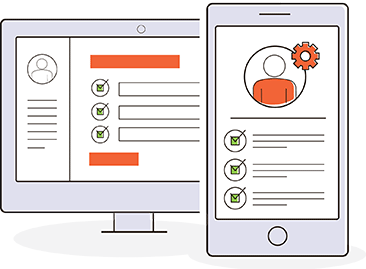Business Process Transformation
How Process Transformation Can Make Your Company More Competitive

Recognizing the difference between change and transformation is essential to any organization seeking to transform processes and the larger systems that encompass them. Naturally, in the digital age, the core of planning a modern process transformation is the application of digital resources. Transforming a modern organization’s internal operations requires bringing the full power of digital resources to bear on the applicable processes. Let’s see what a process transformation is and what achieving it entails.
What is Process Transformation?
Process transformation is to digitally enable a process within an organization’s internal operations and refers to introducing technology that automates most or all tasks involved in a particular process. Process transformation is often part of an entire digital transformation initiative led by the business leaders in the organization.
Transforming business processes is likely to include supporting tasks and processes that contribute to the productivity and efficiency of the target process. The transformative changes streamline the process and reduce waste of time, materials (if applicable), and energy. Business Process Automation (BPA) further minimizes redundancy, improves communications, and delivers many other benefits.
How is Process Transformation Used to Advance Operations?
Implementing business process automation effectively requires identifying the appropriate processes for transformation. Business goals for the project must benefit customers. Each team member must be trained, be assigned objectives, and accountable. Progress must be measurable. Some ways a process transformation is used to advance a company’s operations include:
|
|
What are the Benefits of Process Transformation?
A business’s operations typically feature established processes, shared information, performance tracking measures, interdepartmental communication, etc. All of these functions can be expected to affect and be affected by a digital transformation. Transformative digital technology can make your business substantially more competitive. For example, digital transformation:
- Streamlines processes and systems
- Improves product and service quality
- Software for BPA expands the functionality of IT
- Improves communications
- Save costs
- Increases team efficiency
- Multiplies productivity rates
- Accommodates unplanned growth
- Increases competitiveness
- Positions for merger
- Promotes the employer's brand
Strategic Approaches to Process Transformation
A business process transformation is a stunning achievement, but the key to its success is in the effectiveness of its execution and ongoing use. For the most efficient conversion of processes to accelerate the advancement of the company’s mission:
- Consolidate solutions to form a comprehensive transformation vs. conducting individual projects to implement separate solutions for related use cases.
- Avoid coding entirely from scratch to build and customize a process workflow.
- Create a central portal for everyone involved to participate with each other in activities involved in the project. Help promote transparency and simplicity throughout the project between all involved departments.
Examples of Digitally Driven Process Transformation?
Digital transitions are implemented for transformative change to processes in all facets of operations, administration, sales, and marketing. Just a few common examples you will recognize from across the spectrum of general departmental applications in modern enterprises include:
- Transition from paper to digital process management in production workflows.
- Migrate from siloed data systems to cross-departmental networks.
- Join the marketing and sales segments of the funnel through an integrated CMS.
- Automate workflow tracking in production, warehousing, and shipping systems.
- Automate customer service management systems.
- Convert manual submission processes to auto-generated receivables and payables.
For example, field sales and service employees can produce and transmit invoices at customers’ locations and track the invoice through Receivables.
How Does Integrify Help With Process Transformation?
Integrify helps businesses automate manual processes, design digitally fillable and transmissible forms, and develop dashboard interfaces, self-service portals, performance tracking programs, and auditing processes. We accomplish these transformative process conversions using low-code software to custom design these and other new digital tools.
We build systems for organizations looking to implement and scale new automated processes quickly to modernize operations, Sales, HR, Administration, Finance, and IT systems. Integrify advances companies toward full digital maturity through:
- Process transformation implementation
- Enterprise-wide platform integration
- Digital process building
- Process integration API
- Process metrics and progress reporting
- Digital form design
- Custom service portal implementation
- Custom industry workflow solutions
- Custom department workflow solutions
Integrify’s open API enables us to integrate with your company’s CRM, ERP, HRIS, custom process software, telecom platform, external supply chain management systems, etc. In fully integrated systems, users can move data freely between departments during any process. We provide complete platform implementation services along with coaching to reinforce training.
FAQs About Process Transformation Projects
Frequently asked questions about process transformation include these, among others:
How long does a transformational project take?
As in any major new operations endeavor, implementing an automated business process is a multi-stage undertaking. You need to choose an appropriate process to automate, set measurable goals for continuing progress, assign accountability to every person, use the best digital tool, and train your team. Identifying needed improvements and solutions for an ideally smooth process must be ongoing.
How much in human resources will be required for such an undertaking?
Your new automated functions will be implemented to support humans in their work and skills. To know each person’s role, project managers must be clear on individuals’ knowledge and usual activities to determine the necessary levels of engagement in the digital transformation process.
What happens if there are technical problems or unexpected delays in the conversion?
Any project to implement a new automated business process should have a contingency plan to revert to the previous mode in case of the need to make corrections to the conversion process.
Why Choose Integrify?
Our industry-leading creative platform development and digital process design expertise provide game-changing simplicity of systems and intuitive automated tools for ease of use. Our client staff training, management coaching, and ongoing guidance are unsurpassed for effectiveness in the field. We cut conversion time and eliminate unnecessary complexity and complications. Our open API, low-code programming model fits particular needs and works compatibly with existing technology.
Interested in Transforming Your Processes?
We have a library of resources to help you on your journey to an automated workplace.

